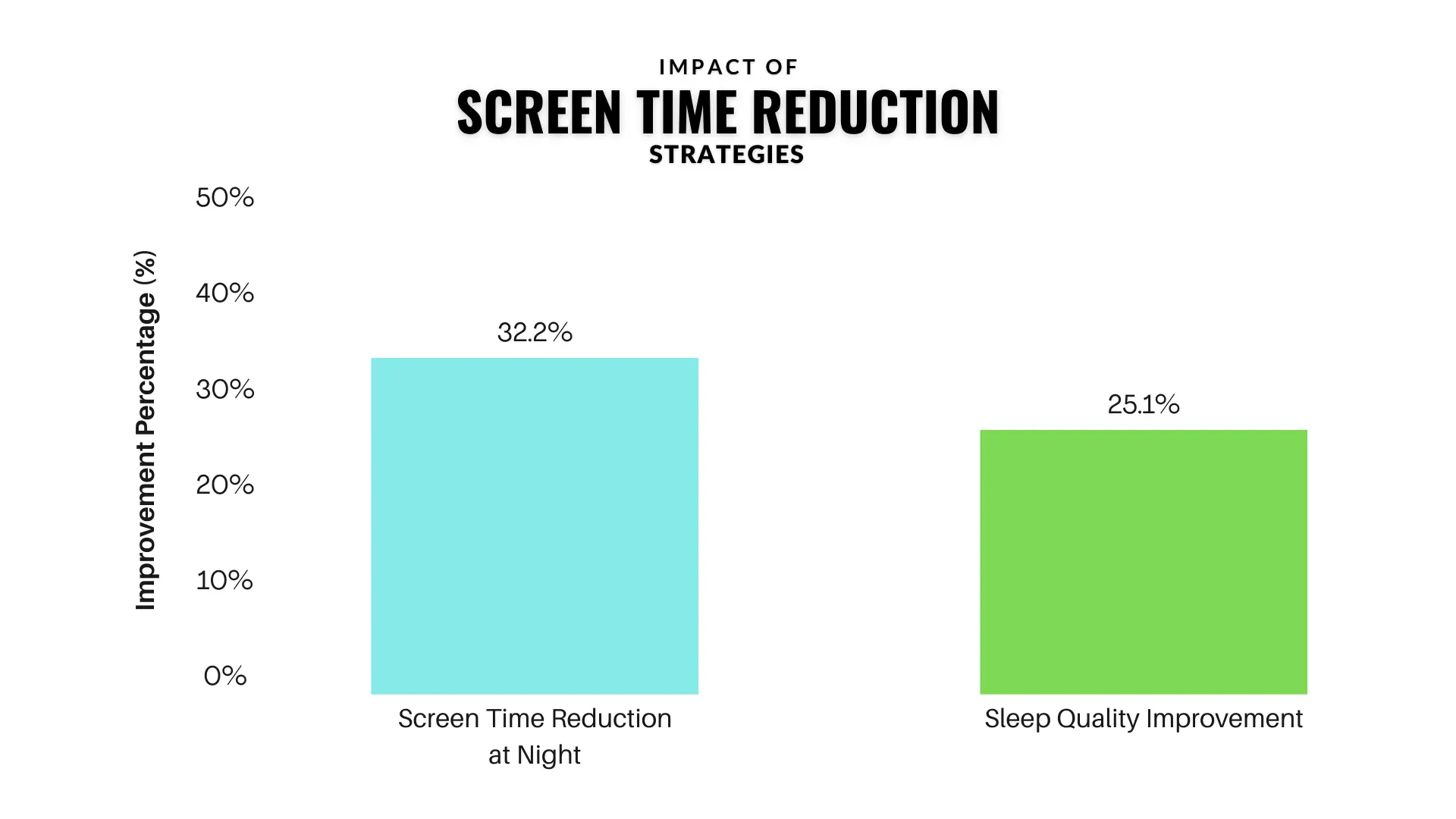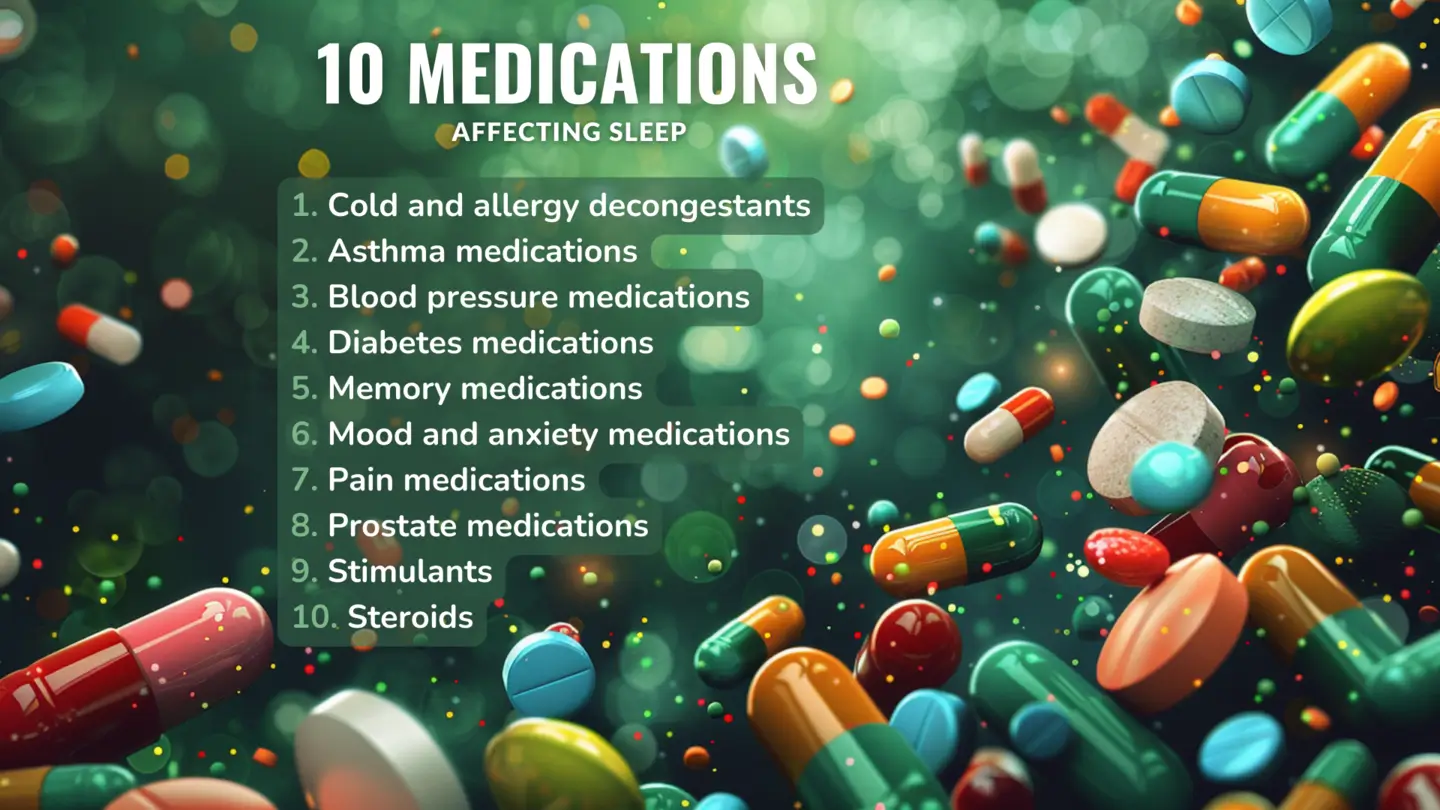Millions of people struggle with insufficient sleep. They toss and turn at night, wake up feeling groggy, and find it hard to concentrate or stay energized throughout the day.
Poor sleep doesn’t just leave you feeling worn out. It can increase your risk of serious health problems like heart disease, obesity, and depression. Frustration builds as quick-fix solutions and endless cups of coffee fail.
SMART Goals for sleep provide the solution. By setting Specific, Measurable, Achievable, Relevant, and Time-bound goals around your sleep habits, you create a structured plan towards getting the rest you crave.
Ready to learn more? Let’s dive into the details of SMART goals for sleep and how they can transform your nights.

The 20 Most Effective SMART Goals for Sleep Better
Improving your sleep is a powerful investment in your health and well-being. From boosting your energy levels to sharpening your focus, quality sleep has ripple effects throughout your life.
This section provides a toolkit of strategies to achieve better, more restful sleep. We’ll cover everything from consistent sleep timing to optimizing your bedroom for maximum relaxation.
"Early to bed and early to rise makes a man healthy, wealthy, and wise."
 Benjamin Franklin
Benjamin Franklin Get ready to transform your nights and revitalize your days!
1. Establish a Consistent Sleep Schedule
Your body’s internal clock, known as the circadian rhythm, thrives on regularity. A consistent sleep schedule helps train this rhythm.
This leads to easier and faster sleep onset, fewer nighttime awakenings, and feeling more refreshed in the morning.
SMART GOAL
- Specific: I will go to bed at 10:30 PM and wake up at 6:30 AM every week day.
- Measurable: I will track my sleep and wake-up times using a sleep app or journal.
- Achievable: This schedule allows for 8 hours of sleep, which is within the recommended range for adults.
- Relevant: A consistent sleep schedule will improve my sleep quality, energy levels, and overall well-being.
- Time-bound: I will commit to this schedule for the next four weeks.
2. Limit Screen Time Before Bed
The blue light emitted by electronic screens (phones, tablets, laptops, TVs) can suppress melatonin production.
Melatonin is a hormone that signals to your body that it’s time to sleep. This light exposure can make it harder to fall asleep and disrupt your sleep quality.
SMART GOAL
- Specific: I will stop using all electronic screens at least one hour before my bedtime.
- Measurable: I will set an alarm on my phone to remind myself to put away screens.
- Achievable: I will replace screen time with a relaxing activity like reading or taking a bath.
- Relevant: Reduced screen time before bed will improve my ability to fall asleep and my overall sleep quality.
- Time-bound: I will start this practice tonight and continue for the next four weeks.

3. Create a Bedtime Ritual
A relaxing bedtime ritual cues your mind and body that it’s time to wind down and prepare for sleep. A predictable routine can enhance feelings of relaxation, making it easier to fall asleep and stay asleep.
SMART GOAL
- Specific: My bedtime ritual will include a warm bath, listening to calming music, and reading for 20 minutes,
- Measurable: I will track the consistency of my routine in my sleep journal.
- Achievable: These activities are relaxing and easily incorporated into my evening routine.
- Relevant: A bedtime ritual will help me fall asleep faster and sleep more soundly.
- Time-bound: I will start my new routine tonight and aim to follow it consistently for the next four weeks.
4. Optimize Your Sleep Environment
Your bedroom environment plays a crucial role in your sleep quality. Factors like darkness, temperature, noise level, and comfort can significantly impact your ability to fall asleep and stay asleep.
SMART GOAL
- Specific: I will make my bedroom as dark, quiet, and cool as possible. This includes using blackout curtains, a sleep mask, earplugs (if needed), and setting the thermostat to a comfortable temperature.
- Measurable: I will assess my sleep environment and take note of any disruptive elements.
- Achievable: I can easily make these changes to my bedroom.
- Relevant: Optimizing my sleep environment will help me enjoy deeper, more restful sleep.
- Time-bound: I will start implementing these changes tonight and continue focusing on improving my sleep environment over the next week.
"Sleep is the best meditation."
 Dalai Lama
Dalai Lama 5. Limit Caffeine and Alcohol Intake
- Caffeine: This stimulant can linger in your system for several hours, interfering with your ability to fall asleep and potentially disrupt the quality of your sleep.
- Alcohol: While alcohol might make you initially drowsy, it can disrupt your sleep later in the night, leading to fragmented sleep and early morning awakenings.
SMART GOAL
- Specific: I will avoid caffeine after 2 PM and limit my alcohol intake to one drink in the evening, several hours before bedtime.
- Measurable: I will keep track of my caffeine and alcohol consumption in my sleep journal.
- Achievable: I can gradually adjust my caffeine intake and set limits on alcohol consumption in the evening.
- Relevant: Limiting caffeine and alcohol will improve my sleep quality and help me wake up feeling more rested.
- Time-bound: I will start with this goal tonight and maintain it consistently for at least three weeks.

6. Exercise Regularly
Regular physical activity offers numerous benefits for sleep. It can help you fall asleep faster, sleep more deeply, and reduce symptoms of insomnia.
SMART GOAL
- Specific: I will aim for at least 30 minutes of moderate-intensity exercise most days of the week. I will schedule my workouts earlier in the day to avoid interfering with my sleep.
- Measurable: I will use a fitness tracker or app to track my exercise minutes and workout times.
- Achievable: I will start by walking for 30 minutes three days a week and gradually increase the frequency and intensity of my workouts.
- Relevant: Regular exercise will improve my sleep quality and overall well-being.
- Time-bound: I will start this new exercise routine this week and aim to be consistent for the next month.
7. Limit Naps
While naps can be restorative, excessively long naps or naps taken too close to bedtime can disrupt your nighttime sleep. They can make it harder to fall asleep at night and lead to feelings of grogginess upon waking.
SMART GOAL
- Specific: I will limit naps to a maximum of 20-30 minutes and avoid napping after 3 PM.
- Measurable: I will track the timing and duration of my naps in my sleep journal.
- Achievable: I can gradually shorten my naps or eliminate them if they interfere with my nighttime sleep.
- Relevant: Limiting naps will ensure I’m sufficiently tired by bedtime and improve my overall sleep quality.
- Time-bound: I will start implementing this nap strategy today and continue for the next two weeks.
8. Eat Lighter Meals at Night
Eating large or heavy meals close to bedtime can interfere with digestion and make it uncomfortable to fall asleep. Acid reflux or discomfort can also disrupt your sleep throughout the night.
SMART GOAL
- Specific: I will eat my last substantial meal at least 3-4 hours before bedtime. If I need a snack before bed, I will choose something light and easily digestible.
- Measurable: I’ll keep a food log in my sleep journal to track meal times and how they affect my sleep.
- Achievable: I can adjust my meal schedule and experiment with lighter evening snacks.
- Relevant: Eating lighter meals at night will improve my sleep comfort and reduce nighttime awakenings.
- Time-bound: I will start making these dietary changes tonight and evaluate their effects over the next two weeks.
"Sleep is that golden chain that ties health and our bodies together."
 Thomas Dekker
Thomas Dekker 9. Practice Mindfulness or Meditation
Mindfulness and meditation techniques can help calm a racing mind and reduce stress and anxiety, which often interfere with sleep.
These practices promote relaxation and can make it easier to fall asleep and stay asleep.
SMART GOAL
- Specific: I will practice guided meditation for 10 minutes before bed. I will use a meditation app or find guided meditations online.
- Measurable: I will track my meditation practice in my sleep journal.
- Achievable: I can easily incorporate meditation into my nighttime routine.
- Relevant: Regular mindfulness practice will help me manage stress and promote better sleep.
- Time-bound: I will start meditating tonight and commit to this practice for the next month.
10. Get Sunlight Exposure
Sunlight exposure, especially in the morning, helps regulate your circadian rhythm. This means your body gets better at knowing when it’s time to be awake and when it’s time to sleep.
SMART GOAL
- Specific: I will aim for at least 15-30 minutes of sunlight exposure within an hour of waking up each day. This could be sitting near a window, taking a walk outside, or having breakfast on the porch.
- Measurable: I will note my sunlight exposure times in my sleep journal.
- Achievable: I can prioritize getting some sunshine early in my day, even if it’s just for a short time.
- Relevant: Regular sunlight exposure will help regulate my sleep-wake cycle and improve my sleep quality.
- Time-bound: I will start this new habit today and continue for the next four weeks.
11. Journal Before Bed
Journaling can be a helpful way to process your thoughts and emotions before bed. This can be particularly beneficial if you find yourself lying awake with a racing mind or worries.
SMART GOAL
- Specific: I will set aside 10-15 minutes before bed to journal about my day, reflect on any worries, or practice gratitude journaling.
- Measurable: I will track my journaling practice and note how it affects my sleep in my sleep journal.
- Achievable: This is a small time commitment that I can easily fit into my evening routine.
- Relevant: Journaling can calm my mind and promote better sleep.
- Time-bound: I will experiment with journaling regularly for the next two weeks to see if it makes a difference in my sleep.

12. Use Comfortable Bedding
The right bedding can make a huge difference in your sleep comfort. Uncomfortable pillows, sheets that are too scratchy or too hot, or an unsupportive mattress can all make it difficult to relax and fall asleep.
SMART GOAL
- Specific: I will assess my current bedding and identify any potential sources of discomfort. This includes my mattress, pillows, sheets, and comforter/blanket.
- Measurable: I will track how my sleep feels after making any changes to my bedding.
- Achievable: I can gradually upgrade my bedding components if necessary (such as investing in new pillows or a mattress topper).
- Relevant: Comfortable bedding will improve my overall sleep quality and experience.
- Time-bound: I will start evaluating my bedding tonight and make a plan for any upgrades over the next couple of weeks.
13. Avoid Fluids Before Bed
Drinking excessive fluids right before bedtime can lead to nighttime awakenings to use the bathroom. This can disrupt your sleep and make it difficult to fall back asleep.
SMART GOAL
- Specific: I will limit my fluid intake in the last two hours before bed and use the bathroom right before getting into bed.
- Measurable: I will track how often I wake up during the night and note any improvements over time.
- Achievable: I can easily adjust my fluid intake habits in the evening.
- Relevant: Limiting fluids before bed will reduce nighttime bathroom trips and improve sleep quality.
- Time-bound: I will start this practice tonight and evaluate how it affects my sleep over the next week.
14. Practice Deep Breathing or Progressive Muscle Relaxation
Deep breathing and progressive muscle relaxation techniques activate your body’s relaxation response. This can help reduce physical tension and promote a sense of calm, making it easier to fall asleep.
SMART GOAL
- Specific: I will practice deep breathing exercises or progressive muscle relaxation for 5-10 minutes before bed. I will find guided exercises online or use an app.
- Measurable: I will track how these practices affect my ability to fall asleep in my sleep journal.
- Achievable: I can easily incorporate these techniques into my bedtime routine.
- Relevant: Regular relaxation practice will help me wind down, decrease stress, and improve my sleep quality.
- Time-bound: I will start these techniques tonight and experiment with them for two weeks to determine their effectiveness.
"The best bridge between despair and hope is a good night’s sleep."
 E. Joseph Cossman
E. Joseph Cossman 15: Establish a No-Work Zone in the Bedroom
It’s important to create a clear separation between your sleep space and your workspace. Seeing work-related items in your bedroom can trigger stress and make it difficult to mentally switch off from work mode.
SMART GOAL
- Specific: I will remove all work-related items from my bedroom, including my laptop, papers, and even my phone if possible (or turn it on silent and place it out of sight).
- Measurable: I will assess my bedroom for work-related triggers and track my ability to mentally disconnect from work before bed.
- Achievable: I can easily remove or relocate work items to another area of my home.
- Relevant: Creating a work-free zone in my bedroom will promote relaxation and improve my sleep.
- Time-bound: I will start this practice tonight and continue for the next four weeks.
16. Listen to White Noise or Relaxing Sounds
White noise or relaxing ambient sounds can help mask disruptive noises and create a calming environment for sleep. This can be particularly helpful if you live in a noisy area or have a partner whose sleep habits differ from yours.
SMART GOAL
- Specific: I will experiment with different types of white noise or relaxing sounds (nature sounds, gentle music) to find what works best for me. I will play them at a low volume throughout the night.
- Measurable: I will track how using these sounds affects my sleep in my sleep journal.
- Achievable: I can easily use apps, websites, or a sound machine to play white noise or relaxing sounds.
- Relevant: Masking disruptive noises will help me fall asleep faster and sleep more soundly.
- Time-bound: I will experiment with different sounds for the next week to see what works best.
17: Set a “Wind-Down” Alarm
A “wind-down” alarm acts as a gentle reminder to start transitioning to bedtime mode. This can help you avoid late-night activities that might interfere with sleep, such as screen time or stressful tasks.
SMART GOAL
- Specific: I will set an alarm on my phone for one hour before my designated bedtime. This alarm will signal the start of my wind-down routine.
- Measurable: I will track my adherence to the wind-down alarm in my sleep journal.
- Achievable: I can easily set an alarm as a reminder and incorporate it into my evening routine.
- Relevant: A wind-down alarm will help me stick to my sleep schedule and prioritize relaxing activities before bed.
- Time-bound: I will start using a wind-down alarm immediately and continue with this practice for the next month.
18. Limit Bedroom Activities to Sleep and Sex
It’s important for your brain to associate your bedroom primarily with sleep and intimacy. Engaging in other activities in bed, like watching TV, working, or scrolling on your phone, can weaken this association and make it harder to fall asleep.
SMART GOAL
- Specific: I will limit my bedroom activities to sleep and sex only. I will move other activities, such as reading or watching TV, to other areas of my home.
- Measurable: I will track how well I adhere to this rule in my sleep journal.
- Achievable: I can gradually transition activities out of my bedroom and establish new routines in designated spaces.
- Relevant: Reserving my bedroom for sleep and sex will strengthen the mental connection between my bedroom and sleep, promoting better sleep quality.
- Time-bound: I will start implementing this change tonight and continue to prioritize it for the next three weeks.
19. Review Your Medications
Some medications can interfere with sleep. These include both prescription and over-the-counter medications. Talking to your doctor is important if you suspect a medication might be disrupting your sleep.
SMART GOAL
- Specific: I will make a list of all the medications and supplements I take and discuss them with my doctor at my next appointment.
- Measurable: I will note any potential side effects related to sleep that my doctor discusses.
- Achievable: I can easily consult with my doctor about my medications.
- Relevant: Understanding any medication-related sleep disruptions will help identify potential solutions and improve my sleep quality.
- Time-bound: I will make this a priority topic at my next doctor’s appointment or schedule a specific appointment to address it.

20. Track Your Sleep
Keeping a sleep journal or using a sleep tracking app can help you identify patterns in your sleep habits. This information can be valuable in pinpointing specific areas for improvement and seeing how the changes you make affect your sleep.
SMART GOAL
- Specific: I will start tracking my sleep using a sleep journal or an app. I will note my bedtime, wake-up time, how long it takes to fall asleep, nighttime awakenings, and my overall sleep quality rating.
- Measurable: I will track my sleep consistently for at least two weeks.
- Achievable: Tracking my sleep only takes a few minutes each day.
- Relevant: Tracking my sleep will give me valuable insights into my sleep patterns and help me measure the effectiveness of the changes I’m making.
- Time-bound: I will start tracking my sleep tonight and consistently record these metrics for the next month.
Important Disclaimer: While the goals outlined in this section aim to promote healthy sleep habits, they do not replace professional medical advice. If you have significant sleep concerns, including suspected sleep disorders, it’s crucial to consult with your doctor or a qualified sleep specialist. They can provide personalized diagnosis and treatment recommendations.
Conclusion
Improving your sleep takes commitment, but the benefits are truly transformative. By implementing the goals and strategies we’ve explored, you can create lasting changes for better sleep, enhanced energy levels, improved mood, and a healthier, more vibrant life.
Remember, consistency and patience are key as your body adjusts to your new habits.
Next Steps
- Choose Your Focus Areas: Reflect on the goals and strategies that resonate most with you. Prioritize a few to start with rather than trying to overhaul everything at once.
- Track Your Progress: Use a sleep journal or app to track your sleep patterns and monitor how your chosen changes are impacting your sleep quality.
- Stay Informed: Continue learning about sleep. Seek out reliable resources and deepen your understanding of the factors that influence sleep.
- Seek Help if Needed: If you’re struggling with persistent sleep issues, don’t hesitate to consult with your doctor or a sleep specialist for guidance and potential treatment options.
Here is a little help to create your sleeping goals:
Free SMART Goal Generator!
Frequently Asked Questions
How do I normalize my sleep schedule?
Start by picking a bedtime and wake-up time that you can realistically stick to, even on your days off. If your current sleep habits are far off from your goal schedule, make gradual changes by shifting your sleep times in 15-minute increments each day.
Creating a relaxing pre-sleep routine with calming activities like taking a warm bath or reading a book can help signal your body that it’s time to wind down.
And remember, ditch those screens (phones, laptops, TVs) at least an hour before bed – their light can wreak havoc on your sleep!
How do I set my sleep goals?
Think of the acronym SMART! Your goals should be specific (like choosing exact bedtimes and wake-up times), measurable (track your sleep), achievable (aim for the recommended amount of sleep), relevant (better sleep means better health), and time-bound (give yourself a deadline).
What is the goal for sleep?
It’s not just about the number of hours you sleep. The main goal of sleep is to feel well-rested, experience improved functioning throughout your day (think better focus, a brighter mood, and more energy), and have the long-term health benefits that come with quality sleep.
How do I find my optimal sleep time?
Pay attention to how you feel after varying amounts of sleep. On days when you have the luxury of sleeping without an alarm, take note of when you naturally wake up feeling refreshed.
Make small adjustments in 15-minute increments until you find the sweet spot. Remember, optimal sleep duration varies from person to person.




